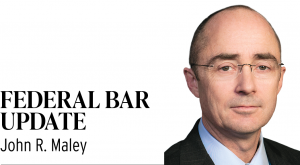Subscriber Benefit
As a subscriber you can listen to articles at work, in the car, or while you work out. Subscribe Now Federal Rules amendments: Effective Dec. 1, various amendments took effect to several rules in the Federal Rules of Civil Procedure, Federal Rules of Appellate Procedure and Federal Rules of Evidence.
Federal Rules amendments: Effective Dec. 1, various amendments took effect to several rules in the Federal Rules of Civil Procedure, Federal Rules of Appellate Procedure and Federal Rules of Evidence.
FRCPs: On the civil side, Rules 6, 15 and 72 were amended and new Rule 87 was added. Rule 6 adds Juneteenth National Independence Day as a legal holiday when the courts are closed. The amendments to Rules 15 and 72 are clarifying and technical clean-ups. New Rule 87 allows the Judicial Conference to declare a Civil Rules emergency if it determines that extraordinary circumstances relating to public health or safety, or affecting physical or electronic access to a court, substantially impair the court’s ability to perform its functions in compliance with the Federal Rules.
FRAPs: On the appellate front, Rules 2, 4, 26 and 45 were amended. Rule 2’s amendment tracks new FRCP 87, allowing the Judicial Conference to suspend the Appellate Rules in emergencies. The changes to Rule 4 are not remarkable. As with the civil rules amendment to Rule 6, Appellate Rules 26 and 45 now include defining legal holidays and will change to include Juneteenth National Independence Day as a legal holiday when the court of appeals is closed.
FREs: Federal Rules of Evidence 106, 615 and 702 were amended. Rule 106 was retiled to “Remainder of or Related Statements,” deleting “writings or recorded” before statements, and likewise deleting that from the text of the rule. The rule now reads: “If a party introduces all or part of a statement, an adverse party may require the introduction, at that time, of any other part — or any other statement — that in fairness ought to be considered at the same time.” The comments explain that with amendment, all statements are covered, including oral statements that have not been recorded. It will now cover statements in any form, including statements through conduct or sign language.
The amendment also added this final new sentence: “The adverse party may do so over a hearsay objection.” The comments explain that this rule of completeness, grounded in fairness, cannot fulfill its function if the party that creates a misimpression about the meaning of a proffered statement can then object on hearsay grounds and exclude a statement that would correct the misimpression. The comments note there was conflict among the federal courts on this issue.
Rule 615 was amended by title and language to go beyond simply excluding witnesses, but to also prevent an excluded witness from access to trial testimony. The new title is, “Excluding Witnesses From the Courtroom: Preventing an Excluded Witness’s Access to Trial Testimony.” New subsection (b) of Rule 615 expressly empowers the court to “prohibit disclosure of trial testimony to witnesses who are excluded from the courtroom; and prohibit excluded witnesses from accessing trial testimony.”
The comments explain that although many courts have found that a Rule 615 order extends beyond the courtroom (indeed, the undersigned has heard that judicial instruction to excluded witnesses countless times), some courts have held that the text of Rule 615 did not provide such authority.
Separately, Rule 615(a) was tweaked to clarify that the exception from exclusion for entity representatives is limited to one designated representative per entity. The comments note, “This limitation, which has been followed by most courts, generally provides parity for individual and entity parties. The rule does not prohibit the court from exercising discretion to allow an entity-party to swap one representative for another as trial progresses, so long as only one witness representative is exempt at any one time.” And, “Nothing in this amendment prohibits a court from exempting from exclusion multiple witnesses if they are found essential.”
Rule 702 was amended in two respects. First, the introductory language was amended as follows: “Rule 702. Testimony By Expert Witnesses. A witness who is qualified as an expert by knowledge, skill, experience, training, or education may testify in the form of an opinion or otherwise if the proponent demonstrates to the court that it is more likely than not that: … .”
Per the comments, this amending language clarifies and emphasizes that expert testimony may not be admitted unless the proponent demonstrates it is more likely than not that the proffered testimony meets the Rule 702 requirements.
Second, Rule 702(d) was amended as follows: “the expert has reliably applied expert’s opinion reflects a reliable application of the principles and methods to the facts of the case.” The Committee Notes explain that the amendment is “to emphasize that each expert opinion must stay within the bounds of what can be concluded from a reliable application of the expert’s basis and methodology.”•
__________
John Maley — [email protected] — is a partner with Barnes & Thornburg LLP, practicing federal and state litigation, employment matters and appeals. He clerked for Judge Larry McKinney from 1988-90, serves as chair of the Local Rules Advisory Committee, S.D. Indiana, and is a member of the Local Rules Advisory Committee, N.D. of Indiana, and the Seventh Circuit’s Civil Pattern Jury Instructions Committee. Opinions expressed are those of the author.
Please enable JavaScript to view this content.
